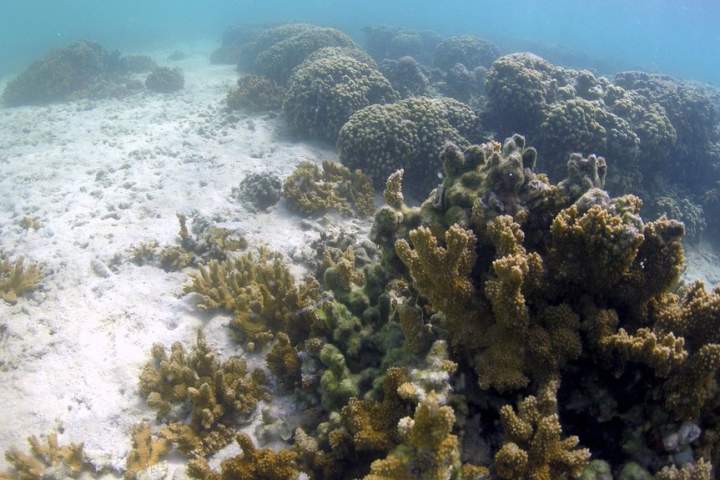Science
Coral Reefs Face Irreversible Decline, Scientists Warn Ahead of COP30

Global warming is escalating more rapidly than previously anticipated, leading scientists to declare that the world’s coral reefs are nearing an almost irreversible die-off. This alarming assessment comes from the Global Tipping Points report, which synthesizes research from over 160 scientists worldwide. The report identifies what they describe as the first “tipping point” in climate-driven ecosystem collapse, just weeks before the upcoming COP30 climate summit in Brazil, set to take place at the edge of the Amazon rainforest.
The report highlights that the Amazon rainforest itself is at heightened risk of collapse if the average global temperature exceeds just 1.5 degrees Celsius, primarily due to ongoing deforestation. Researchers have revised down the estimated threshold for the Amazon, underscoring the critical state of this vital ecosystem. Another area of concern is the potential disruption of the Atlantic Meridional Overturning Circulation (AMOC), a significant ocean current that helps regulate winter climates in northern Europe.
“Change is happening fast now, tragically, in parts of the climate and the biosphere,” stated Tim Lenton, an environmental scientist at the University of Exeter and lead author of the report. Despite these dire warnings, Lenton noted some hopeful developments, particularly in the energy sector. For the first time, renewable energy sources generated more electricity than coal, according to data from the nonprofit think tank Ember.
“We still have some agency,” Lenton emphasized, urging nations to take decisive action to reduce climate-warming carbon emissions during the COP30 discussions in November.
The urgency of the situation is underscored by the rapid changes occurring in nature. Average global temperatures have already risen by approximately 1.3 to 1.4 degrees Celsius above preindustrial levels, as confirmed by data from U.N. and EU science agencies. The last two years have recorded the highest temperatures in history, with marine heatwaves impacting 84 percent of the world’s coral reefs, leading to widespread bleaching and mortality among coral populations. Coral reefs are essential for marine biodiversity, supporting around a quarter of all marine life.
For coral ecosystems to have a chance of recovery, scientists suggest that global efforts must aim to bring temperatures down to just 1 degree Celsius above preindustrial levels. “The new report makes clear that each year, the scope and magnitude of the negative impacts of climate change are increasing,” said Pep Canadell, a senior scientist at Australia’s CSIRO Climate Science Centre.
Currently, global policies are projected to lead to a temperature rise of about 3.1 degrees Celsius by the end of this century, a trajectory that could have catastrophic implications for ecosystems worldwide. As nations prepare for COP30, the need for urgent and unified climate action has never been more critical.
-

 Lifestyle2 months ago
Lifestyle2 months agoWinnipeg Celebrates Culinary Creativity During Le Burger Week 2025
-

 Health2 months ago
Health2 months agoMontreal’s Groupe Marcelle Leads Canadian Cosmetic Industry Growth
-

 Science2 months ago
Science2 months agoMicrosoft Confirms U.S. Law Overrules Canadian Data Sovereignty
-

 Education2 months ago
Education2 months agoRed River College Launches New Programs to Address Industry Needs
-

 Technology2 months ago
Technology2 months agoDragon Ball: Sparking! Zero Launching on Switch and Switch 2 This November
-

 Science2 months ago
Science2 months agoTech Innovator Amandipp Singh Transforms Hiring for Disabled
-

 Technology7 days ago
Technology7 days agoDiscord Faces Serious Security Breach Affecting Millions
-

 Technology2 months ago
Technology2 months agoGoogle Pixel 10 Pro Fold Specs Unveiled Ahead of Launch
-

 Science2 months ago
Science2 months agoChina’s Wukong Spacesuit Sets New Standard for AI in Space
-

 Technology2 months ago
Technology2 months agoWorld of Warcraft Players Buzz Over 19-Quest Bee Challenge
-

 Business2 months ago
Business2 months agoDawson City Residents Rally Around Buy Canadian Movement
-

 Technology1 week ago
Technology1 week agoHuawei MatePad 12X Redefines Tablet Experience for Professionals
-

 Education2 months ago
Education2 months agoAlberta Teachers’ Strike: Potential Impacts on Students and Families
-

 Business2 months ago
Business2 months agoNew Estimates Reveal ChatGPT-5 Energy Use Could Soar
-

 Science2 months ago
Science2 months agoXi Labs Innovates with New AI Operating System Set for 2025 Launch
-

 Technology2 months ago
Technology2 months agoInnovative 140W GaN Travel Adapter Combines Power and Convenience
-

 Technology2 months ago
Technology2 months agoFuture Entertainment Launches DDoD with Gameplay Trailer Showcase
-

 Technology2 months ago
Technology2 months agoGlobal Launch of Ragnarok M: Classic Set for September 3, 2025
-

 Technology2 months ago
Technology2 months agoNew IDR01 Smart Ring Offers Advanced Sports Tracking for $169
-

 Technology2 months ago
Technology2 months agoArsanesia Unveils Smith’s Chronicles with Steam Page and Trailer
-

 Science2 months ago
Science2 months agoNew Precision Approach to Treating Depression Tailors Care to Patients
-

 Business2 months ago
Business2 months agoBNA Brewing to Open New Bowling Alley in Downtown Penticton
-

 Technology2 months ago
Technology2 months agoHumanoid Robots Compete in Hilarious Debut Games in Beijing
-

 Health2 months ago
Health2 months agoGiant Boba and Unique Treats Take Center Stage at Ottawa’s Newest Bubble Tea Shop










